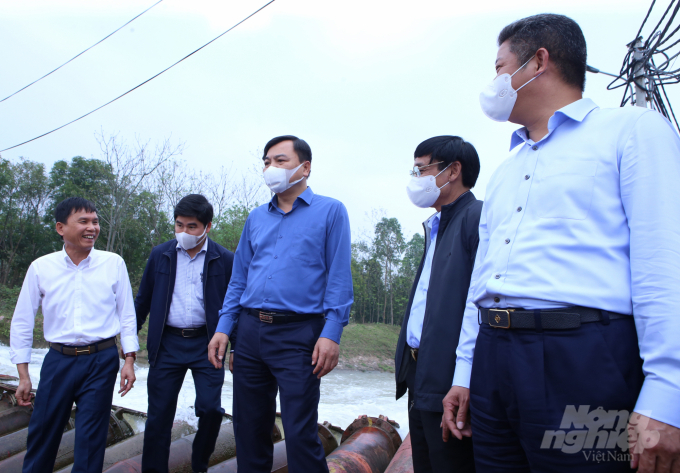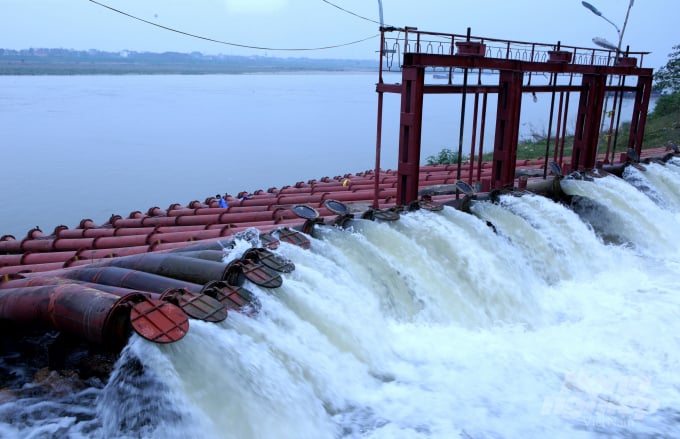May 20, 2025 | 06:54 GMT +7
May 20, 2025 | 06:54 GMT +7
Hotline: 0913.378.918
May 20, 2025 | 06:54 GMT +7
Hotline: 0913.378.918

Deputy Minister Nguyen Hoang Hiep (center) inspected the water supply at Phu Sa field pumping station (Son Tay town, Hanoi) in February 2021. Photo: Minh Phuc.
On July 22, the Directorate of Water Resources (Ministry of Agriculture and Rural Development) hosted a workshop on the management of dam and irrigation reservoir safety and the implementation of the Dam safety repair and upgrade project (WB8) in 2021.
According to statistics, Vietnam has developed a world-class water resources infrastructure consisting of 6,759 reservoirs and 592 dams with a combined storage capacity of approximately 14.5 billion cubic meters, providing irrigation water for nearly 1.1 million hectares of agricultural land and water for human and industrial consumption.
By using a range of financial sources, the state invested and planned to guarantee the safety of numerous dams and reservoirs. Including the Dam safety repair and improvement project (WB8), about 198 reservoirs have been upgraded or repaired so far.
However, 1,100 medium and small reservoirs constructed three to four decades ago need improvement owing to degradation, flood vulnerability, and safety concerns.
Deputy Minister of MARD Nguyen Hoang Hiep said at the workshop that in the second half of the year, particularly during the next flooding season, all reservoirs must be 100% secure. “Ensuring total safety in the face of climate change, severe flooding, and rain is a difficult job, particularly for municipal governments. However, it is an order that must be obeyed at all costs, as damaged reservoirs would pose enormous dangers, including societal instability,” the deputy minister said.
To carry out the order, he directed concerned localities to concentrate on four primary solutions including strictly adhere to the law and delegate management of works in accordance with decentralization; 16 provinces must complete the establishment of an Advisory Board to advise provincial People's Committees; strictly adhere to 16 provisions of the reservoir safety regulation, and advise authorities at the departments.

Deputy Minister Nguyen Hoang Hiep requested to ensure 100% safety for reservoirs when the rainy season is approaching. Photo: Minh Phuc.
“The financing of the WB8 project only partly supports irrigation work,” the head of the Ministry of Agriculture and Rural Development said. Concerning the other 1,100 reservoirs classified as potentially damaged, the Ministry of Agriculture and Rural Development's medium-term public investment resources will concentrate on just 10-20 big reservoirs in the future years, leaving local small reservoirs to bear the entire responsibility. Local governments should invest VND1-2 billion in upgrading and repairing reservoirs to guarantee their safety, rather than spending hundreds of billion dongs to restore them if anything goes wrong.”
Currently, 130 lakes have been finished as part of the WB8 project, 198 lakes are under development, and 150 lakes have not been created.
Deputy Minister Nguyen Hoang Hiep proposed that the Central Management Board of irrigation projects be in charge of directing and closely coordinating with local governments in order to resolve any issues. As a result, it is essential to expedite the building of 198 lakes and ensure their completion on schedule; and conduct a study of 150 unconstructed lakes.
“We often recount the narrative of how an institution breathes life into the law. Indeed, we are bringing laws to life, enacting legislation and enforcing compliance. That is inconceivable.
Now, we must thoroughly and plainly modify a number of Decrees and Circulars relating to dam and reservoir safety in order to breathe new life into the legislation. The Directorate of Water Resources is charged with providing extremely specific advice to local governments about laws, circulars, decrees, rules, and standards...” - Agriculture and Rural Development Deputy Minister Nguyen Hoang Hiep said.

(VAN) World Environment Day 2025 (June 5) carries the theme 'Beat Plastic Pollution' continuing to emphasize the global urgency of addressing the plastic waste crisis.

(VAN) This was the assessment shared by experts at the workshop titled 'Assessing the Role and Potential of Low-Emission Rice Production Systems in Vietnam,' held on the morning of May 19.

(VAN) Cai Rong Port is the fisheries control center of Quang Ninh, helping to monitor fishing vessels, combat IUU fishing, and remove the EC's 'yellow card'.

(VAN) The German Agricultural Society (DLG) explores the possibility of establishing a mechanization service center in Vietnam’s Mekong Delta to support farmers in accessing and utilizing advanced machinery.

(VAN) On May 16, the Department of Water Resources Management, in collaboration with the Food and Agriculture Organization of the United Nations (FAO), held a signing ceremony for the GEF-8 project document.

(VAN) Food safety, mechanization, vocational training, and market opening are key areas of cooperation expected between the Vietnamese Government and the Federal Republic of Germany.

(VAN) Deputy Minister Nguyen Quoc Tri also expressed his hope that Cuba will soon overcome its current challenges, attain food security, and further expand cooperation with Vietnam.